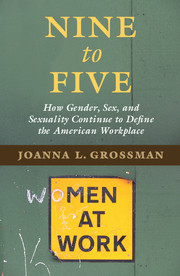Book contents
- Frontmatter
- Dedication
- Contents
- Foreword
- Acknowledgments
- Introduction
- PART I WHAT IS SEX DISCRIMINATION?
- PART II SEXUAL HARASSMENT
- PART III PREGNANT WOMEN AND MOTHERS AT WORK
- 31 Pregnant Truckers and the Problem of Light-Duty Assignments
- 32 A Big Win for Pregnant Police Officers
- 33 Undue Burden
- 34 Hard Labor: New Pregnancy Discrimination Guidance from the EEOC
- 35 Forceps Delivery: The Supreme Court Narrowly Saves the Pregnancy Discrimination Act in Young vs. UPS
- 36 The Pregnancy Discrimination Act Reaches Advanced Maternal Age
- 37 The Pregnant Workers’ Fairness Act: A Time for Change?
- 38 The Supreme Court Deals a Blow to Once-Pregnant Retirees
- 39 If She Does Not Win It Is a Shame
- 40 Must Employers Who Cover Prescriptions Cover Contraception?
- 41 Fertile Ground for Discrimination
- 42 Can a Woman Be Fired for Absenteeism Related to Fertility Treatments?
- 43 Is Lactation Related to Pregnancy?
- 44 A Victory for Families, but Hardly a Panacea
- 45 A Small Step in the Right Direction: The Family and Medical Leave Act at Twenty
- 46 “Best Practices” to Promote Work-Family Balance
- PART IV FEMALE BREADWINNERS AND THE GLASS CEILING
- Conclusion
- Notes
- Index
44 - A Victory for Families, but Hardly a Panacea
from PART III - PREGNANT WOMEN AND MOTHERS AT WORK
Published online by Cambridge University Press: 05 May 2016
- Frontmatter
- Dedication
- Contents
- Foreword
- Acknowledgments
- Introduction
- PART I WHAT IS SEX DISCRIMINATION?
- PART II SEXUAL HARASSMENT
- PART III PREGNANT WOMEN AND MOTHERS AT WORK
- 31 Pregnant Truckers and the Problem of Light-Duty Assignments
- 32 A Big Win for Pregnant Police Officers
- 33 Undue Burden
- 34 Hard Labor: New Pregnancy Discrimination Guidance from the EEOC
- 35 Forceps Delivery: The Supreme Court Narrowly Saves the Pregnancy Discrimination Act in Young vs. UPS
- 36 The Pregnancy Discrimination Act Reaches Advanced Maternal Age
- 37 The Pregnant Workers’ Fairness Act: A Time for Change?
- 38 The Supreme Court Deals a Blow to Once-Pregnant Retirees
- 39 If She Does Not Win It Is a Shame
- 40 Must Employers Who Cover Prescriptions Cover Contraception?
- 41 Fertile Ground for Discrimination
- 42 Can a Woman Be Fired for Absenteeism Related to Fertility Treatments?
- 43 Is Lactation Related to Pregnancy?
- 44 A Victory for Families, but Hardly a Panacea
- 45 A Small Step in the Right Direction: The Family and Medical Leave Act at Twenty
- 46 “Best Practices” to Promote Work-Family Balance
- PART IV FEMALE BREADWINNERS AND THE GLASS CEILING
- Conclusion
- Notes
- Index
Summary
In Hibbs v. Department of Human Resources, the Supreme Court upheld the FMLA as constitutional when applied to the states. Among other things, that means that sufficiently large employers must grant twelve weeks of unpaid maternity and paternity leave per year.
The decision is important, and ironic, for several reasons. For one thing, surprisingly, it was a pro-federal power decision authored by Chief Justice Rehnquist – a committed conservative with a history of upholding states’ rights against the exercise of federal power. For another thing, from a civil rights perspective, the decision may offer little tangible benefit, and even take away more than it gives.
At the same time that Rehnquist's majority opinion validates the FMLA's exercise of federal power, the decision cements the Court's recent efforts to hamstring Congress in other ways. For instance, the decision reiterates that Congress cannot define the substantive equality guarantees of the Fourteenth Amendment. In addition, it operates under the assumption that Congress cannot enact substantive entitlements pursuant to its powers under Section 5 of the Fourteenth Amendment. While the Court's conservative block had laid the groundwork for this in recent cases involving Eleventh Amendment challenges to other federal civil rights statutes intended to apply to the states (which the Court did not ultimately allow), Hibbs gave Justice Rehnquist the opportunity to reinforce and apply that precedent while appearing to promote civil rights.
Thus, while approving this relatively narrow civil rights law, the Court preserved its ability to strike down other, broader acts, at least to the extent they are applied to the states.
MR. HIBBS GOES TO WASHINGTON
Mr. Hibbs, the plaintiff, was an employee in the Welfare Division of the Nevada Department of Human Resources, a unit of Nevada's state government. He sought unpaid leave from his job to care for his ailing wife. Nevada granted him the leave under FMLA, as well as under a “catastrophic leave” policy, but later fired him anyway. (The parties disputed, among other points, whether the two kinds of leave should be concurrent or consecutive.) Hibbs sued under the FMLA, but Nevada argued for dismissal because of the sovereign immunity provided by the Eleventh Amendment. The trial court agreed with Nevada, but the U.S. Court of Appeals for the Ninth Circuit agreed with Hibbs.
- Type
- Chapter
- Information
- Nine to FiveHow Gender, Sex, and Sexuality Continue to Define the American Workplace, pp. 254 - 258Publisher: Cambridge University PressPrint publication year: 2016



